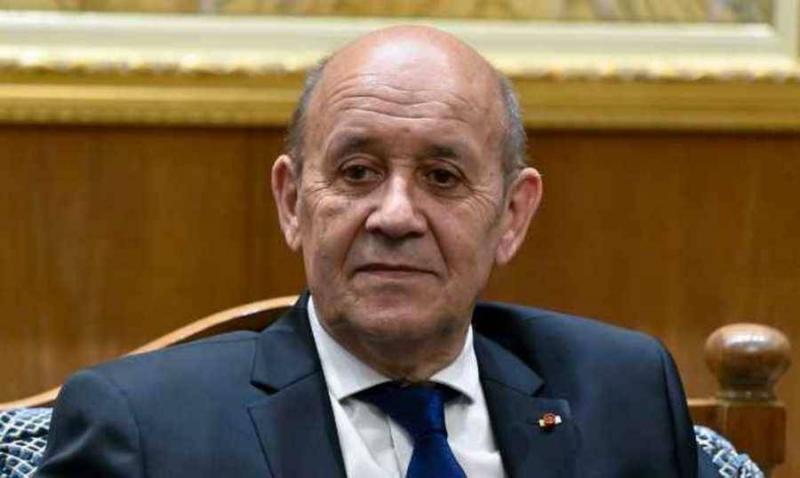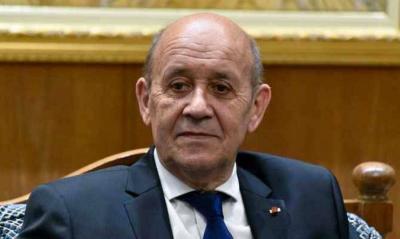Parliament Speaker Nabih Berri is keeping to himself the mechanism of movement that he intends to follow once the holiday break is over to translate his commitment to making the presidential elections his primary concern, aiming to resolve the crisis surrounding the election. However, some speculate that his actions will depend on the outcome of communications to prepare political conditions for the meeting of the quintet committee composed of the United States, France, Saudi Arabia, Egypt, and Qatar. This committee may provide the necessary support for the return of French presidential envoy, former Foreign Minister Jean-Yves Le Drian, to Beirut next month, in pursuit of solidifying the preference for a third presidential candidate as a path to implementation, citing the difficulty for the two candidates—former MP Sleiman Frangieh and former Minister Jihad Azour—in securing the parliamentary majority needed for one of them to win, according to "Asharq Al-Awsat."
Le Drian's return for a fourth round of meetings with parliamentary bloc leaders, as he had committed during his last visit, is still on the table, although the date has not yet been set. He may be waiting for the quintet committee's meeting and its potential resolutions, which would allow him to act accordingly. This expectation also applies to the Qatari envoy, in light of discussions regarding his readiness to continue his mission.
Political sources closely monitoring the efforts to extricate the presidential election from its current crisis are keen to see what ideas Le Drian will bring to reinvigorate the presidential file, and whether this will be postponed until after the ongoing war in Gaza between Hamas and Israel ends, especially since he had pledged to the parliamentary bloc leaders during his last tour that he would return in the first month of the coming year. Those sources question whether Le Drian can disentangle the presidential file from the outcomes of the war in Gaza, and how Hezbollah will respond and how willing it is to engage in efforts to prioritize the presidential election, even though the Deputy Secretary-General, Sheikh Naim Qassem, emphasized in his recent speech the need to prioritize finding a solution to end this war.
They highlight that Le Drian's mere return to Beirut (assuming the quintet committee convenes before his arrival) signifies renewed political backing for his mission, specifically regarding the preference for a third presidential option, based on his conviction that there is a necessity to elect a president who meets the criteria set by the committee to rescue Lebanon. They assert that time will not favor the successful completion of the presidential election if the presidential vacancy is prolonged beyond the end of the war in Gaza.
The same sources question the feasibility of electing a president amid ongoing military confrontations between Hezbollah and Israel along the northern front, especially as this remains tied to the active war in Gaza and the support of Hezbollah for Hamas. They inquire about the future of an elected president and whether he could transition Lebanon, even gradually, from the current crisis mixed with instability in the south to a recovery phase, assuming that the southern front remains unchanged and does not escalate further.
They see it as premature to rush decisions and stress the need for caution to ensure that, if Le Drian decides to return to Beirut with a set of new ideas drawn up by the quintet, the election of a president will not again be placed on hold, and can be detached from the situation in Gaza. This scenario places Hezbollah in a position that may be difficult for it to resolve easily unless it decides not to link the south with the circumstances that Gaza may eventually stabilize under.
Until clarity emerges, should Le Drian solidify his decision and return to Beirut with a series of new ideas shaped by the quintet members, who continue their consultations in preparation for a potential meeting if deemed necessary, Frangieh is persistent in his candidacy for the presidency against his opponents, notably Army Commander General Joseph Aoun, who still holds considerable chances following his extension, even though he has yet to announce his candidacy.
Notably, some opposition figures support Frangieh, and his name was included in a list proposed by former Progressive Socialist Party leader Walid Jumblatt, alongside Azour and former MP Salah Hanin. The presidential file was addressed during a meeting between Jumblatt and the Democratic Gathering, attended by MPs Tony Frangieh, Akram Shehayeb, Wael Abu Faour, former Minister Youssef Saad, Progressives Secretary-General Zafer Nasser, and Jumblatt's advisor Hassan Harb, alongside discussions regarding the appointment of a Chief of Staff, which was received with understanding and support from the Marada movement, despite differing views on the presidential issue.
Sources close to the meeting informed "Asharq Al-Awsat" that the atmosphere was positive, and Frangieh (as conveyed by his visitors) is moving forward with his presidential candidacy and has no intention of withdrawing, asserting that no one has requested his withdrawal. They relayed that Frangieh confirmed his final decision will not be reconsidered, leaving lawmakers free to choose whoever they want, while simultaneously denying that any regional or international entity has placed a veto on his election, emphasizing that this was relayed directly to him from both Arab and foreign ambassadors.
Frangieh reflects on the comments of several visitors who assert that a presidential candidate must enjoy the support of one of the largest Christian parliamentary blocs. The lingering question remains: Is Frangieh still banking on Hezbollah's role in persuading Bassil to reconsider his stance on supporting him? Especially since his alignment with the opposition in favor of Azour might belong to the past, given the current peak of his political clash with the Lebanese Forces and other opposing factions surrounding their support for the extension of the Army Commander, whom the opposition views as having significant presidential prospects, potentially the leading candidate to rival Frangieh, who has conveyed through his visitors that he will continue fighting for the presidency, even if he stands alone.




